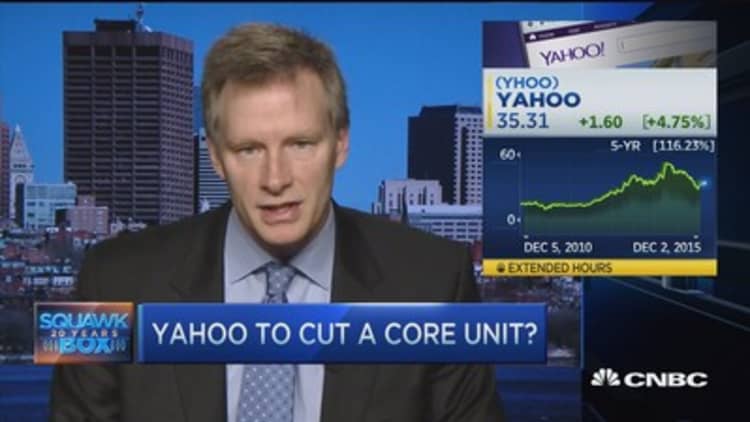


Though now the spinster of the technology world, Yahoo was once courted in one of the biggest technology mergers ever proposed. But today, the company may be likely to consider a sale, even at the fraction of the price — if it can find a suitor, experts told CNBC.
Shares of Yahoo were up more than 6 percent Wednesday after news it would consider selling its flagship Internet business at a series of meetings this week, according to rumors that surfaced overnight on the tides of a Wall Street Journal report.
Less than a decade ago, Yahoo turned down a premium of 62 percent in a bid from Microsoft, in a deal valued around $45 billion at one point. Time has taken a toll: A sale of the core business could generate $6 to $8 billion, even as Yahoo's portals provide an instant avenue to millions of eyeballs, wrote Robert Peck, of SunTrust Robinson Humphrey, in a research note.
Part of the issue, of course, is the changing landscape for technology companies. While old-line technology companies such as Microsoft have shifted toward offerings in software, cloud and enterprise, much of Yahoo's value lies in aggregating viewers for advertisers — a role that had traditionally been played by media companies, said Scott Kessler of S&P Capital IQ.
Add complicated tax rules around Asian equities and a coming interest rate hike, and the potential course of action becomes even more convoluted. So who would buy Yahoo?
"If the company were to sell the core, we think both private equity and strategic buyers would be interested," wrote Peck.
"While there are likely several interested PE firms, investors have suggested the core asset could be attractive for large media and telco companies like Comcast, AT&T/DirecTV, Verizon/AOL, NewsCorp, Disney, CBS ... and others," he wrote.
He told CNBC that international players like Alibaba and SoftBank might also have potential. That opinion was echoed by Kessler, though he cautioned the strength of the U.S. dollar could be a deterrent.
"Really for the first time, it seems more plausible for a variety of different companies to pursue Yahoo," Kessler said, drawing a parallel Verizon's acquisition of AOL as a potential model. "I think at the beginning, it was limited to either private equity or an Asian Internet conglomerate. Now there are Internet, media, telecom and cable companies that I think can probably do a pretty good job of leveraging core assets. There is an impetus to do so now more than when [CEO Marissa] Mayer joined the company."

In particular, Kessler added that companies might want to finance an acquisition soon, in advance of a potential Federal Reserve interest rate hike that would increase borrowing costs.
But RBC Capital Markets analyst Mark Mahaney said that while there are plenty of reasons to buy Yahoo, he doesn't see a natural buyer out there.
"Are there natural buyers?" Mahaney said on CNBC's "Squawk Box" Wednesday. "There should be for the following reasons: This is still a very large asset on the Internet — hundreds of millions of users. It's a potentially profitable business. Google has shown that. Facebook has shown that. And it's one that's been very inexpensively priced in the public markets. That's a setup for some interested, strategic bidder to come in."
Yahoo's upcoming December board meeting is just a latest development in a year-long imbroglio as the value of the core business has paled in comparison to its stake in e-commerce giant Alibaba.
Tuesday's Journal article, wasn't, of course, the first to speculate that Yahoo's best-known services like Mail, Finance and Search may have a future in the private market. When the sale of Yahoo's Alibaba stake was announced Jan. 27, technology reporters in The New York Times and Re/code were quick to debate the company's value as a takeover target.
Meanwhile, over the past 12 months, the value of Yahoo's core business in the public market has gone from close to zero to negative, key executives have departed and outside consulting firms have entered the fray. Activist investors Starboard Value LP pushed harder that Yahoo in a shareholder letter on Nov. 19:
"What was once complicated and opaque, has now crystallized when analyzed through the lens of reward compared to possible risk," Jeffrey Smith, managing member of Starboard Value LP, wrote in the letter. "Over the last several months, we have come to realize the situation at Yahoo is one with potential asymmetric outcomes, and therefore we believe selling the core business now is the best outcome for Yahoo shareholders."
To be sure, some have cautioned that it's premature to plant the "For Sale" sign on Yahoo's front lawn.
"Careful with Yahoo news, everyone," tweeted Nicholas Carlson, author of "Marissa Mayer and the Fight to Save Yahoo!" "A big investor wrote a letter demanding Yahoo sell its core business. Of course that notion has to be considered at a regularly scheduled board meeting. That said, I still think Mayer's easiest path to claiming victory is selling and then pointing to the [money] she returned to shareholders."
Vocal investor Eric Jackson also expressed doubts in a blog post on TheStreet.com.
"While there's obviously pressure on the board and Mayer to show results, it is going to be difficult for the board to agree with Starboard that the best course of action after overseeing a nuclear wasteland destruction of value in the core business under their watch is to now sell at the lows," Jackson wrote.
Further, Yahoo has options beyond selling the core business, writes Peck, such as spinning the core, selling the entire company, outright sale of Asian assets, or several iterations of wait-and-see tactics.
"It's more likely that they are considering a sale," Kessler said. "But the thought is, if the people Mayer brought in really weren't able to reignite growth in the company, why would a third party be able to do that?"
Yahoo did not respond to a request for comment.
— Disclosures: Comcast is the owner of NBCUniversal, the parent company of CNBC and CNBC.com. CNBC has a content-sharing partnership with Yahoo's finance site and Re/code.




